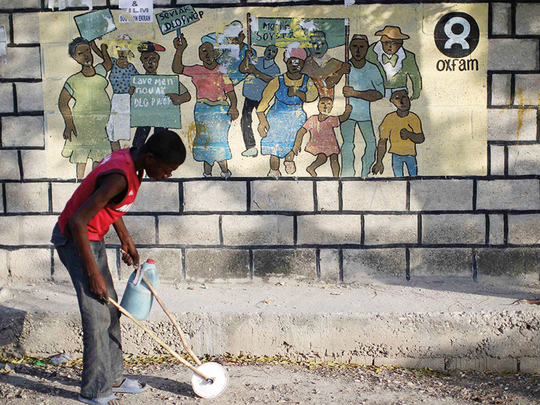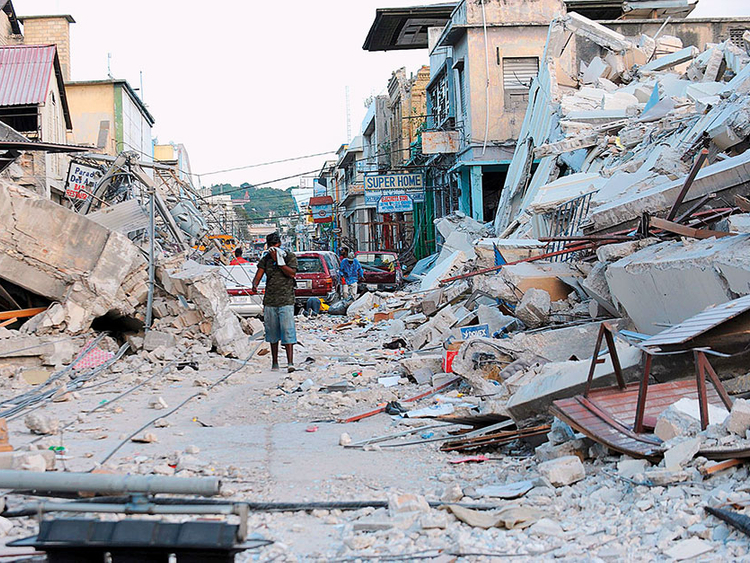
MADRID: While charities working in the international aid sector have been quick to distance themselves from claims of sexual abuse tarnishing Oxfam, the reality is that a broad range of those organisations have dealt with similar accusations against their staff members.
As one former Irish international worker put it: “When you’re working in a war zone or after a natural disaster, emotions can run high. There’s lots of excitement, lots of alcohol and no real structure. Head office is a long way away,” he said — and some people give little thought to long-term repercussions.
Over the past ten days, the British arm of the international aid agency, Oxfam, has been hit by a series of allegations that date back to the aftermath of the horrific 2010 earthquake that rattled Haiti, killed an estimated 220,000, injured some 330,000 more and left 1.5 million homeless in one of the world’s poorest nations. Even before the earthquake, 85 per cent of the population of the capital, Port au Prince, were living in slum conditions.
Oxfam was among the first international aid agencies to send in relief workers — but reports surfaced last week that some of those workers turned Oxfam’s living compound into a virtual brothel.
“They were throwing big parties with prostitutes,” one whistle-blowing former aid worker said. “These girls were wearing Oxfam T-shirts, running around half-naked, it was like a full-on Caligula orgy. It was unbelievable. It was crazy.”
But while Oxfam is carrying the brunt of the fallout, other aid agencies have a chequered record with similar allegations arising in Cote d’Ivoire and South Sudan. United Nations peacekeepers have also been charged for buying sex from vulnerable girls and women in Nepal, the Central African Republic, Haiti, the Democratic Republic of Congo and Cote d’Ivoire.
Scale of abuses
Sadly, the trend is not a new nor isolated phenomenon. The scale of abuses by peacekeepers and aid workers was underestimated, the non-governmental organisation Save the Children reported 10 years ago. Back then, it found children were forced into sex and were trading sexual favours for food.
In one case cited by Save the Children, a 15-year-old girl was offered 100 Haitian gourdes — Dh7.75 — and some chocolate for intimate favours on two aid workers.
Sadly, the report also noted: “Children as young as six are trading sex with aid workers and peacekeepers in exchange for food, money, soap and, in a very few cases, luxury items such as mobile phones.”
The phenomenon has been under-reported because the victims are often too afraid to come forward — or simply have nowhere else to turn.
“The people who are raping us and the people in the office are the same people,” said one young Haitian girl who told her story of being sexually exploited to Save the Children field investigators.
The fieldwork took place in Haiti in 2007, before the alleged abuse was carried out by Oxfam workers there.
“Our research suggests that children and their families are not speaking out because of a mix of stigma, fear, ignorance and powerlessness,” the report noted.
“In addition, it appears that at the grass roots level international agencies are not yet perceived as responding effectively to allegations — with the consequence that victims and others cannot see the point of reporting abuse.”
Ironically, despite highlighting the issue, Save the Children recently said it had fired 16 staff and referring 10 to police and civil authorities for inappropriate behaviour.
Irish aid agency Goal, which has provided aid efforts in Syria, Turkey, Central American and across central Africa, has dealt with at least seven cases of sexual misconduct claims over the past eight years. Most of those were working on international projects and were terminated following internal investigations.













